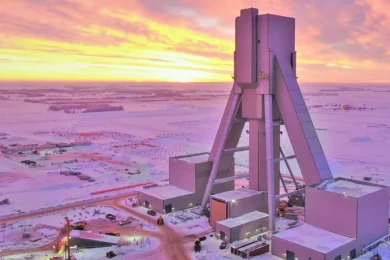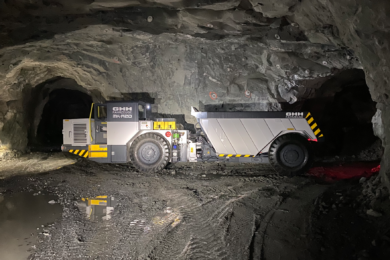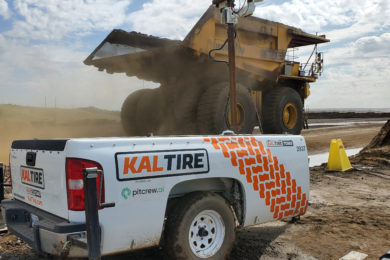After some delays due to COVID-19, Ok Tedi Mining, the 100% PNG owned open-pit copper and gold mine located in the Star Mountains of the Western Province of Papua New Guinea, has become one of the few mining companies in the world to operates its own on minesite tyre pyrolysis plant.
The company states: “Our Waste Management Department in January commissioned a new tyre pyrolysis plant which was built by Raw Power Systems (RPS), an Australian company specialised in pyrolysis.” This is a 5 t pilot plant which has the capacity to process the waste tyres stream as it is generated. Going forward, a larger plant is contemplated to start working through the waste tyres stockpile.
The plant produces fuel oil from old tyres by decomposing (not burning) the tyres. Apart from the fuel oil that is produced, the other two products that will come out from the plant are scrap steel wires and what RPS and Ok Tedi refer to as char. The fuel oil can be used as a substitute for diesel which is one of the main reasons the plant has been established.
IM reached out to both RPS and Ok Tedi Mining to get more insight into the project
IM: The pilot unit was shipped to Ok Tedi in 2021, can you confirm why it is only up and running now – was this due to COVID-19 restrictions?
RPS: That is correct. The equipment arrived on site shortly before borders closed and installation was delayed until PNG and OK Tedi mine were open. The plant was installed by personnel from the mine Waste Management Department under the supervision of Hendrick Min, Manager – Waste Management Department, Ok Tedi Mining and Sandy Kelly, RPS Director of Engineering.
IM: Why did Ok Tedi choose RPS?
RPS: Ok Tedi were seeking a solution to deal with the waste tyres being generated annually and with an eye also to remediating the waste tyres stockpile. RPS proposed a pyrolysis solution which was attractive to OTML because first – a pilot scale plant could be installed to validate the suitability of the technology; and second – the output products could be used in the mine operations – so there is a circular economy effect. RPS was selected because of its experience in the design and supply of systems which produce alternate fuels from low value feedstocks.
IM: Is it still the plan to develop a larger pyrolysis facility?
OTML: The 5 t per day pyrolysis plant is a pilot. The 10 t per day pyrolysis plant is something we would like to have installed in the near future, subject to successful implementation of the pilot plant. Our immediate focus is to maximise the use of 5 t per day pilot pyrolysis plant and develop the learnings required to pave way for the next step.
IM: Both you and Ok Tedi have said that the pilot plant produces fuel oil, steel wire and “char” but don’t mention carbon black – what do you mean by “char”?
RPS: Carbon black and recovered carbon black are terms commonly used to describe the output of the pyrolysis process. We refer to the product as carbon char, which we consider a more accurate description as it is approximately 80% carbon and the rest is other components and ash. RPS is working with Griffith University (Queensland) to research and develop processes which will add value to the carbon char produced at the Ok Tedi site. This may lead to applications for recovery of precious metals from tailing systems; segregation of environmentally hazardous materials within the operational settings; and
environmental applications for both remediation and rehabilitation.
IM: How is the recovered fuel oil set to be used at Ok Tedi?
OTML: The plan currently is to use this fuel oil at the lime kiln and high temperature incinerator. Preliminary assessments have shown a good burn rate for use as substitute for diesel usage at the lime kiln and for cleaned waste oil usage at the incinerator.
IM: Was the plant fabricated in Australia or China or a bit of both?
RPS: The plant has Australian design elements with some fabrication undertaken in China and some supply from Australia.
IM: Is the main focus of RPS now biodiesel rather than pyrolysis or are both still focus areas?
RPS: RPS is a environmental engineering company currently focussing on the development of systems for the mining sector including the re-processing of waste tyres to produce tyre pyrolysis oil which is a useable fuel and char; and the distillation of waste oil to produce diesel. These systems enable the on-site waste streams to be converted in an economical manner to products or fuels which can be used on site. The solves an environmental issue by processing the waste streams – and assists the bottom line by producing fuel on site and the associated reduction in transport costs.










